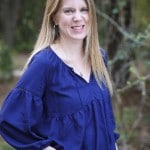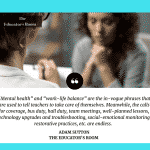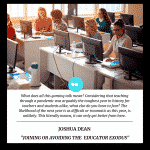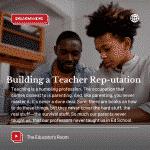 Sarah Styf is a 19-year high school English teacher currently on a teaching sabbatical. She lives in the Houston area with her husband and two children. She is passionate about education reform and civic engagement. She can be found on Instagram @sarah.styf and Twitter @sarahstyf.
Sarah Styf is a 19-year high school English teacher currently on a teaching sabbatical. She lives in the Houston area with her husband and two children. She is passionate about education reform and civic engagement. She can be found on Instagram @sarah.styf and Twitter @sarahstyf.When we experience moments of pause, we are often able to finally see the truths about our lives that we couldn’t see from the inside.
I knew that for nearly 20 years teaching had been more than just a job for me; it had been an integral part of my identity. But when I lost a teaching position a couple of months ago, it forced me to do some careful evaluation of how my chosen career had driven nearly every sector of my life.
I come from a long line of teachers. I had great-aunts who were teachers, my dad was a teacher, and I have aunts and uncles who are teachers. I’m the first of 23 grandchildren, many of whom have become teachers.
What I’m saying is that this is not a profession I entered blindly. I had entered the family business. Most of my closest friends in college were also going into teaching. I paid attention to my professors and fieldwork co-ops. I even got annoyed with my student teaching co-op when she expressed concern that her soon-to-be-married student-teacher wouldn’t be able to successfully balance family life with teaching. (She was right, but she had it backward.)
[bctt tweet=”I knew that it could be an all-consuming profession, but I don’t think I fully comprehended just how all-consuming it could be until I had my first classroom.” username=””]
From the beginning, I started to understand how little I knew and how much more I needed to know. I sought out weekend workshops and started early inquiries into graduate school programs. I taught summer school and looked at summer workshops that became part of vacations with my husband. I read everything I could and spent hours searching on the internet to find better ways to teach.
As a young teacher, I was sucked into the world of extra-curriculars, using what little knowledge I had from high school to suddenly work as co-director of the drama program at my first school and then primary director at my next school. Now it wasn’t just grading and lesson planning that sucked me dry. I found extra life in the hours I spent after school with my theatre kids, but that weeks-on-end of rehearsals, weekend set building and choreography days, and hell-weeks full of late nights, challenged my marriage and prevented me from enjoying much of life outside of the school building.
When we finally had kids and I discovered the joys of motherhood, it didn’t change my desire to teach but it did change the type of teacher I wanted to be. I dropped the extracurriculars but shifted the laser focus to my classroom. I started grad school, spent summers at AP workshops and later as an AP reader, and dove into pedagogy with a passion I had earlier reserved for reading through potential scripts for my drama kids. When I shifted my creative energies to working as a yearbook adviser, I suddenly found a new distraction from non-teacher life, constantly thinking about photography and layout ideas that I could pass along to my staffers.
Through all of the years of teaching, the one thing I haven’t been able to do is shut off the teacher switch. Our family had vacations that centered around workshops or were scheduled around camps I needed to attend with my students. When my husband and I took trips without our own children to Gettysburg and later the Bourbon Trail, I spent hours considering how I could tie in my new Civil War knowledge into our study of American Literature or how I could use my new Prohibition knowledge in our study of The Great Gatsby. I took my kids through Hannibal, MO so that I could see Mark Twain’s hometown and hope to find some information that I could use to enhance my teaching of Huck Finn. One day later I stopped with them in Little Rock on our way home to Texas, racing my six and eight-year-old through the Central High School National Historic Site so I could gather more information that I could use in my classroom when we discussed civil rights.
It wasn’t just vacations. Leisure activities, such as reading or watching movies or documentaries turned into research for teaching potential. More often than not, I considered if it was something I could somehow use in my English classes or wondered how I could get certain students to pick up a book that I felt would speak to them, even if they had no desire to take the necessary time to read it. I read and viewed everything through a teacher lens, checking for quality, appropriateness, and potential impact.
Even when I should have been shutting off the teacher switch, I just couldn’t do it. Teachers don’t get sick days, not really. Sure, they are in the contract and they are supposed to take them in case of illness, but nearly every teacher will attest to the fact that it is more work to be gone than it is to be in school, no matter how miserable you feel. In the days before a global pandemic, I only stayed home if I had a verified fever. I’ve taught without a voice, with terrible head colds, full-body coughing fits, and pounding headaches. I even completed lesson plans from a hospital bed after I went into labor hours before my last official day of school before maternity leave. (The doctor threatened to increase my dosage and speed things along if I didn’t stop working through contractions.)
Add to all of the above: recommendation letters that must be written during every month of the year, students who reach out even during vacations, and parents who expect responses to emails, even on the weekends.
In short, teachers who take their jobs seriously don’t have an off switch. They are constantly thinking about how they can be better, how they can better teach that lesson plan, how they can better relate to that student, how a student who has been struggling is doing now, and so much more.
Did I know all of this before I stepped into my first classroom? Yes, kind of, but not really. There’s a significant difference between knowing something to be true in your head and experiencing something as true in your entire body and soul.
And for nearly 20 years, that has been my constant state, my body, and soul consumed by a profession that I chose, a profession that I felt called to, a profession that I love.
When I found myself unexpectedly without a teaching job only a few weeks into the new year, I discovered just how much of my mental energy had been expended on my career over nearly 20 years. Suddenly, the very prospect of leisure felt daunting, overwhelming even. I don’t know what to do if I’m not considering how I can improve that lesson plan or better help that student. I don’t know how to plan if that plan doesn’t include a calendar with each unit broken down by weeks. I don’t know how to turn it off.
It is nearly impossible to explain to people who are not close to the profession just how much harm this is doing to the field necessary for educating our country’s future, but it is a conversation we cannot and should not be afraid to have.
Our health of our teachers and the future of education depend on it.






